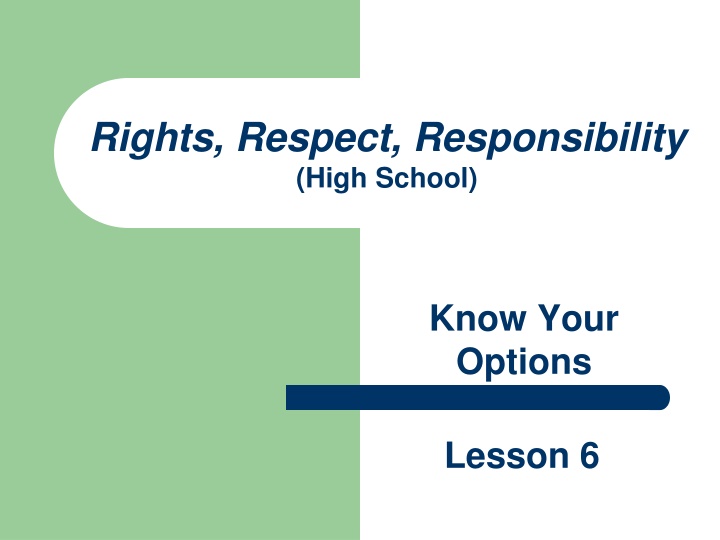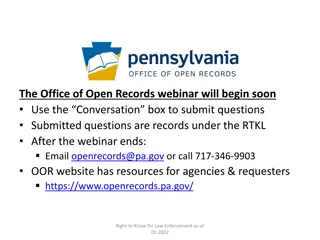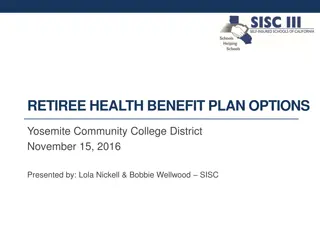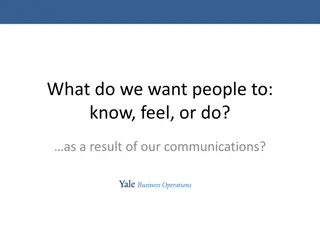
Birth Control Options and Responsibilities
Explore the importance of contraception and birth control methods, including abstinence, condoms, and the pill, to prevent unplanned pregnancies. Learn about reasons for using or not using birth control and engage in group activities to understand teen options.
Download Presentation

Please find below an Image/Link to download the presentation.
The content on the website is provided AS IS for your information and personal use only. It may not be sold, licensed, or shared on other websites without obtaining consent from the author. If you encounter any issues during the download, it is possible that the publisher has removed the file from their server.
You are allowed to download the files provided on this website for personal or commercial use, subject to the condition that they are used lawfully. All files are the property of their respective owners.
The content on the website is provided AS IS for your information and personal use only. It may not be sold, licensed, or shared on other websites without obtaining consent from the author.
E N D
Presentation Transcript
Rights, Respect, Responsibility (High School) Know Your Options Lesson 6
Reminders Let s review our ground rules and procedures as a class. Remember to use the Anonymous Question Box!
Introduction Today we re going to look at contraception, or birth control, such as abstinence, condoms, and the pill. Remember that in order for a pregnancy to occur, a sperm must fertilize an egg and implant in a uterus. This typically happens during vaginal sex when a penis ejaculates into a vagina and the semen which contains the sperm travels through the cervix, uterus, and fallopian tubes to come into contact with an egg. When a fertilized egg implants in a uterus, this is called a pregnancy.
Introduction The only 100% effective way to avoid a pregnancy is not to have vaginal sex. However, if people of different sex do decide to have sex, then contraception, or birth control, can safely and effectively decrease the risk of an unplanned pregnancy if used consistently and correctly.
Why Might a Person Use Birth Control? Let s brainstorm! Who does our list apply to? How do their partners come into play? What rights and responsibilities do they have? Which of these reasons could apply to people in same sex relationships? We typically think of different sex couples as being the only ones at risk for unplanned pregnancy. But some of these concerns apply to all people regardless of sexual orientation or gender. Keep this in mind.
Why Would a Person or Couple NOT Use Birth Control? Let s brainstorm!
Group Activity: Teen Options Now we re going to look at some scenarios of different teens who are considering using birth control. Your group will get some information about a teen and will use this information to take the Which Contraception is Right for Me? quiz on this website. This website is geared towards cisgender girls and women, but a lot of the information can apply to anyone. 1. You may not know the answer to every question based on the scenario, so it s ok to take your best guess at some answers. 2. Once you ve done the quiz, write down the top 3 recommended birth control methods for your scenario. 3.
Group Activity: Teen Options 4. Take a few minutes to discuss why you think those three methods were the ones most highly recommended by the quiz. Write down any ideas from your group on the worksheet. 5. Select one method and reason to share with the class. Share the scenario, the method, and the reason why it was recommended. 6. As you talk about methods, I ll use my birth control kit to show you that method.
Group Activity: Teen Options Wrenches 7. Now we will rotate papers so each group gets a new teen to look at. 8. This time, a wrench will be thrown in your teen s plans to use birth control. 9. Figure out how your teen could deal with that wrench in order to successfully use birth control. 10. The ideas must be realistic and not a Hollywood ending!
Group Discussion: Teen Options What was it like to do that activity? Why? Did you notice anything about the methods that were recommended most highly for teens? Would you recommend something different for your teen than what the quiz recommended? Since most birth control is geared towards people with ovaries and a uterus, how might someone who doesn t have these body parts feel about accessing and using contraception? What role should the partner play in this process? How could you help a friend who wanted to use birth control?
Birth Control Summary Birth control methods fall into three categories: Abstinence Barrier Methods Hormonal Methods Each method has an effectiveness rate that tells how well it can work to prevent pregnancy when used consistently and correctly. The best birth control method is the one that is used consistently and correctly.
Abstinence Abstinence is the most effective way to prevent pregnancy and protect against HIV and STIs. This option is available to everyone. Abstinence means not having oral, vaginal, or anal sex, or any genital-to-genital touching. Here are some ways to plan for abstinence: Talk with your partner. Discuss different ways to show affection. Find activities you can do with other couples. Avoid alcohol and drugs. 1. 2. 3. 4.
Long-Lasting Hormonal Methods Injection (Shot) o An injection administered by a healthcare practitioner every 3 months. o Available with a prescription and can be administered at a clinic or at any licensed pharmacy. o 99% effective if used consistently and correctly. Intrauterine Device (IUD) Tiny device inserted into the uterus. Can last from 3-6 years depending on the type of IUD. Available with a prescription and must be inserted by health care practitioner at a doctor s office or clinic. 99% effective at preventing pregnancy when used consistently and correctly. o o o Implant oTiny rod inserted into arm. o Available with a prescription and must be inserted by health care practitioner at a doctor s office or clinic. o 99% effective if used consistently and correctly. o
Hormonal Methods Ring Pills o Taken daily. o Prevents release of egg from ovary. o Available with a prescription at clinics. o 99% effective at preventing pregnancy when used consistently and correctly. o Inserted into vagina for 3 out of 4 weeks. o Prevents release of egg from ovary. o Available with a prescription at clinics. o 99% effective at preventing pregnancy when used consistently and correctly. Patch o Placed on body for 3 out of 4 weeks. o Prevents release of egg from ovary. o Available with a prescription at clinics. o 99% effective at preventing pregnancy when used consistently and correctly.
Barrier Methods External Condoms Covers erect penis. Available without a prescription at drugstores or clinics. 98% effective at preventing pregnancy when used consistently and correctly. Internal Condoms Inserted into vagina or anus. Available with a prescription at drugstores or clinics. 95% effective at preventing pregnancy when used consistently and correctly. Dental Dams o A thin sheet of latex can be used to protect mucosa during oral sex. o o o Available without a prescription at clinics. o Not a birth control method, but used to prevent transmission of HIV and STIs. o Spermicides oUsed with other barrier methods to immobilize or kill sperm. o o o Available without a prescription at drugstores or clinics. o o 72-82% effective at preventing pregnancy when used alone.
Barrier Methods Cervical Cap Soft silicone cap placed inside vagina to cover cervix. Available with a prescription at clinics. 86% effective at preventing pregnancy when used consistently and correctly. Sponge o o Small spongey plastic placed inside vagina to cover cervix. o o Available without a prescription at drugstores and clinics. o o 91% effective at preventing pregnancy when used consistently and correctly. Diaphragm Shallow silicone cup placed inside vagina to cover cervix. Available with a prescription at clinics. 94% effective at preventing pregnancy when used consistently and correctly. o o o
Emergency Contraception (E.C.) Prevents pregnancy after unprotected sex or when birth control fails. Does not work if someone is already pregnant; does not harm fetus. Can be taken up to 3 days (72 hours) after unprotected sex. Available at clinics or pharmacies: Plan B One-Step is available without a prescription for a person of any age. People under 15 years may need a prescription for other brands. Call 888-NOT2LATE for where to find over-the-counter E.C.
Protection from HIV and STIs Hormonal, intrauterine, and some barrier methods of contraception DO NOT offer protection against HIV and STIs. Using a condom with these methods can reduce the risk of pregnancy and reduce the risk of contracting HIV and STIs.
CONTRACEPTION COMPARISON CHART Protection Against STIs Method Description Effectiveness Length of Protection Abstinence Not having intercourse 100% Continuous YES Device implanted in uterus by a doctor Intrauterine 99% IUD 10 yrs.; IUS 5 yrs. NO Hormone rods place under skin for 3 years (prescription) Implants 99% 3 years NO Progestin shot given every 12 weeks (prescription) Injections 94 99% 3 months NO Hormone ring inserted in vagina for 3 weeks (prescription) Ring 91 99% 1 month NO Hormone patch placed on skin for 3 weeks (prescription) Patch 91 99% 1 week NO Hormones taken daily (prescription) Pills 91 99% 1 month NO Latex or polyurethane sheath that covers the penis External Condom 82 98% One sex act YES Polyurethane tube with flexible ring that fits the cervix Internal Condom 79 95% One sex act YES Foam, gel, film inserted into vagina Spermicide 72 82% Up to 1 hour or one sex act NO
Safely Surrendered Baby Law Parent or legal guardian can surrender a newborn baby within the first 72 hours of birth to a person at a designated safe surrender site such as a hospital or fire department. Parent may claim physical custody of newborn within 14 days of surrender. More Information: (877) 725-5111 or http://www.babysafe.ca.gov/
Sterilization Vasectomy Tubal Ligation For a person with ovaries: This is a safe and effective surgical procedure that permanently prevents pregnancy by closing or blocking fallopian tubes. For a person with a penis: A vasectomy is a simple, safe, and effective surgical procedure that permanently prevents pregnancy by blocking sperm from leaving the body. A tubal ligation, sometimes called getting your tubes tied , will not protect against STIs or HIV. A vasectomy will not protect against STIs or HIV. A person needs to be 18 years old or have the consent of their parent or legal guardian to receive this procedure A person needs to be 18 years old or have the consent of their parent or legal guardian to receive this procedure.
Summary I m handing out a brochure called Respect Yourself, Protect Yourself which has information on all FDA- approved contraceptive methods. It s important for everyone to know about contraception because even if you don t use it personally, you may have friends or be a partner of someone who does.
Protective Factors In California, anyone of any age is allowed to get birth control, including condoms and methods that require a prescription, without notifying parents or getting permission. Students may be released from school by a staff member, such as a nurse or counselor, to attend a sexual healthcare appointment at a clinic. You can get free condoms from our School Nurse and local clinics.
Homework 1. Read through the instructions on the Emergency Contraception Investigation homework sheet. 2. Do an online investigation to respond to the questions on the homework sheet. 3. An alternative printout is available for people who do not have access to the Internet.






















